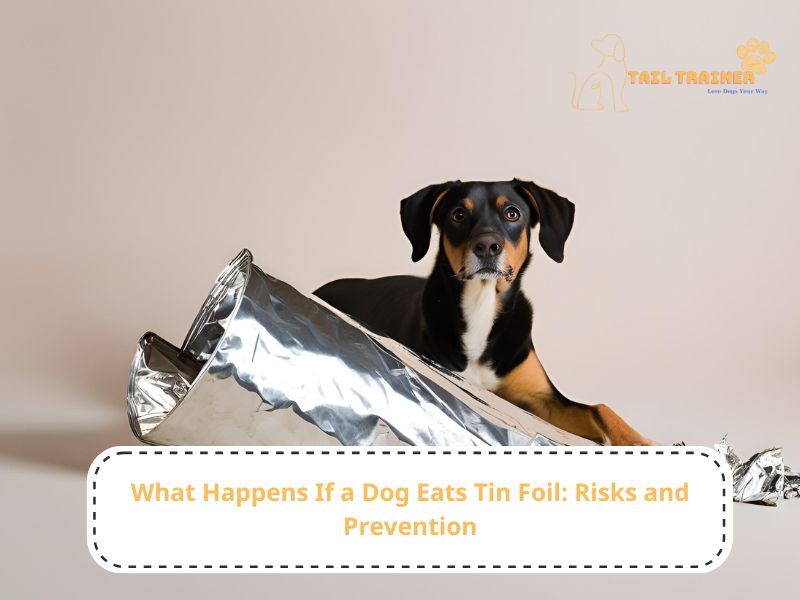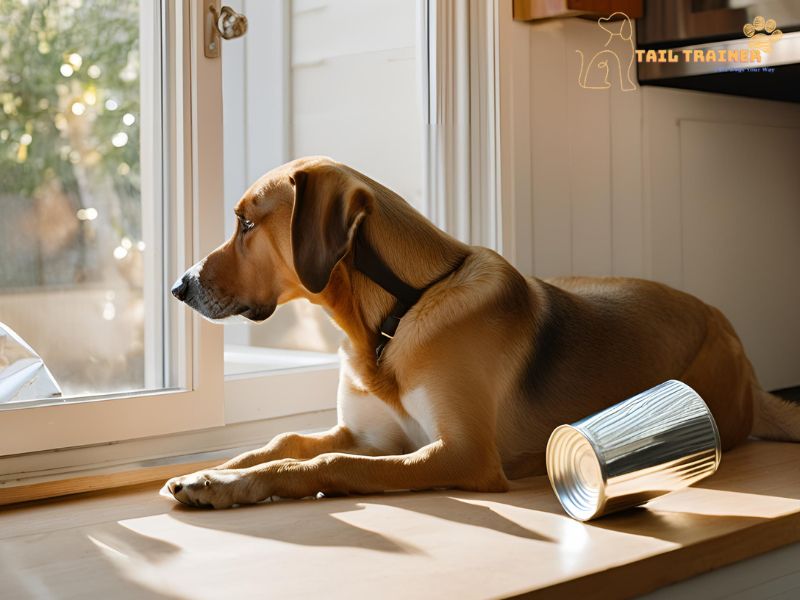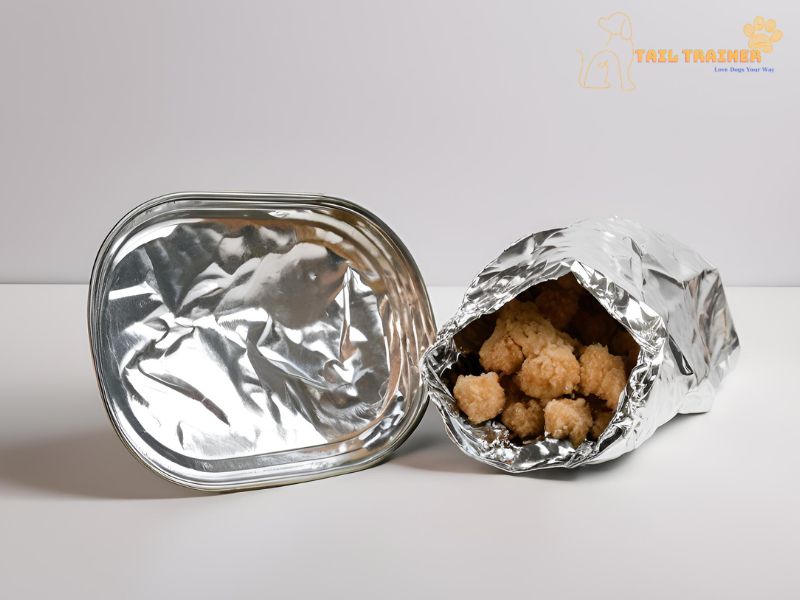If a dog eats tin foil, it can lead to digestive blockages, choking, or more severe health problems like internal injuries. While dogs are curious by nature, swallowing tin foil can have serious consequences. Learn more about how to protect your pet by visiting Tail Trainer regularly.
Key Takeaways
What Happens If a Dog Eats Tin Foil?
If a dog eats tin foil, it can cause choking, digestive blockages, or internal injuries. Prompt action and veterinary advice are critical to prevent complications.
Immediate Risks of Dogs Eating Tin Foil

Dogs often find tin foil enticing because it smells like food. However, eating tin foil presents several immediate dangers, primarily related to the dog’s digestive system and airways.
Choking Hazard
Tin foil can easily become lodged in a dog’s throat, especially if it’s swallowed in large pieces or crumpled into a ball. Choking can lead to:
- Gagging or coughing as the dog tries to expel the foil.
- Difficulty in breathing if the foil obstructs the airway.
- Panic behavior as the dog struggles to dislodge the foil.
If your dog is choking on tin foil, try to remain calm and check its mouth for visible obstructions. If it’s safe, attempt to remove the foil. Otherwise, take your dog to the vet immediately.
Digestive Blockage
Even if the dog manages to swallow the tin foil, it can cause a blockage in the digestive tract. Since tin foil isn’t digestible, it can accumulate and block the intestines, preventing normal digestion.
Symptoms of Digestive Blockage
Look out for these symptoms, which may indicate a blockage:
- Vomiting or repeated attempts to vomit without success.
- Loss of appetite as the dog feels discomfort.
- Constipation or difficulty passing stool, which may indicate that the intestines are obstructed.
- Abdominal pain, noticeable if your dog yelps when its stomach is touched or appears unusually sensitive.
Internal Injuries
Tin foil can have sharp edges, which increases the risk of internal injuries. As it moves through the digestive system, it can scrape or puncture the lining of the stomach or intestines.
Symptoms of Internal Injury
If internal injury occurs, symptoms can be more severe and may include:
- Bloody vomit or bloody stool, which indicates internal bleeding.
- Lethargy or extreme weakness due to loss of blood or pain.
- Abdominal swelling, which may suggest inflammation or internal damage.
If you notice any of these symptoms, contact your veterinarian immediately for emergency care.
Long-Term Health Risks of Eating Tin Foil

While immediate risks are more urgent, there are also long-term health effects that could arise if the tin foil is not properly removed or treated.
Risk of Intestinal Damage
If tin foil is not expelled from the dog’s body, it can cause lingering problems in the intestines, such as:
- Chronic inflammation of the intestinal walls, which can lead to pain and discomfort.
- Increased risk of intestinal perforation, where the foil punctures the intestinal lining, potentially leading to a severe infection called peritonitis.
Toxicity Concerns
Some tin foil may be contaminated with food residues or chemicals. If ingested, these contaminants could be toxic, leading to additional health issues, including:
- Food poisoning, especially if the foil was used to wrap raw meat or spoiled food.
- Chemical poisoning, if the foil contains residue from cleaning agents or pesticides.
Symptoms of Toxicity
Watch for symptoms like:
- Excessive drooling
- Severe vomiting
- Disorientation or confusion
- Tremors or seizures
What to Do If Your Dog Eats Tin Foil

If you discover that your dog has eaten tin foil, quick action is crucial to prevent complications. Here’s how to respond:
Step 1: Assess the Situation
First, determine how much tin foil your dog may have eaten and whether it is choking or breathing normally.
- If choking, attempt to remove the foil if it’s visible in the mouth or throat.
- If not choking, monitor your dog closely for any signs of digestive upset or discomfort.
Step 2: Contact Your Veterinarian
Even if your dog seems fine, it’s important to call your veterinarian. Describe the situation, including the amount of tin foil ingested, and follow their instructions.
When to Visit the Vet Immediately
Take your dog to the vet right away if it shows any of the following signs:
- Persistent vomiting
- Lack of bowel movements
- Severe abdominal pain or swelling
- Breathing difficulties
Step 3: Provide Supportive Care
While waiting for veterinary assistance, keep your dog calm and prevent further ingestion of foil or other foreign objects. Offer water to prevent dehydration but avoid feeding solid food until advised by the vet.
Preventing Future Incidents
To prevent your dog from eating tin foil in the future, you can make some changes around your home and establish safer habits.
Keep Foil Out of Reach
Always dispose of tin foil immediately after use and ensure that trash cans are secure. Use lidded trash cans or place trash bags in cabinets to keep them out of reach.
Train Your Dog to Leave It
Training your dog to obey the “leave it” command can be incredibly helpful in preventing ingestion of harmful objects, including tin foil. Start by teaching your dog to drop items from its mouth on command, and reward it for compliance.
If you want to enhance your dog’s behavior, consider joining our dog training course. Our course offers practical tips to prevent unwanted behaviors, keeping your dog safe from hazards like tin foil ingestion.
Provide Safe Alternatives
Give your dog appropriate toys and chew treats to keep it entertained and prevent curiosity-driven behaviors, such as investigating kitchen trash.
Frequently Asked Questions
Can tin foil be digested by dogs?
No, tin foil cannot be digested by dogs. It can pass through the digestive system if it’s small enough, but larger pieces are likely to cause blockages or internal injuries.
How long does it take for a dog to pass tin foil?
If the tin foil passes through the digestive system without complications, it may take 24-48 hours. However, if symptoms like vomiting, constipation, or abdominal pain occur, consult a vet immediately.
Is aluminum foil toxic to dogs?
Aluminum foil itself is not toxic, but it can be dangerous if it causes blockages, choking, or internal injuries. If the foil contains toxic residues from food or chemicals, poisoning is possible.
Should I induce vomiting if my dog eats tin foil?
Do not induce vomiting unless directed by your veterinarian. Vomiting can cause further injury if the tin foil has sharp edges or is large enough to cause damage on the way back up.
What should I feed my dog after it eats tin foil?
Consult your vet before offering food. If the dog is cleared to eat, provide soft, bland foods like boiled chicken and rice to ease digestion and reduce irritation.
Stay informed and keep your dog safe by visiting Tail Trainer regularly! Understanding potential hazards, like tin foil ingestion, is key to responsible pet ownership.
